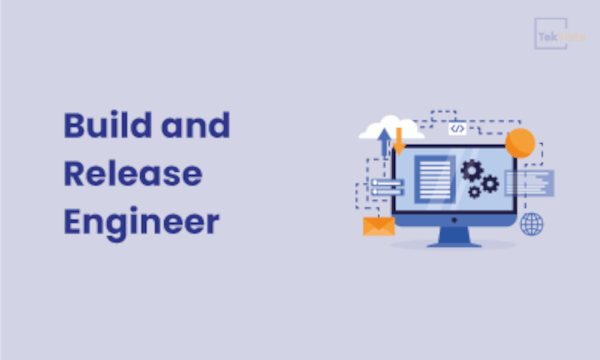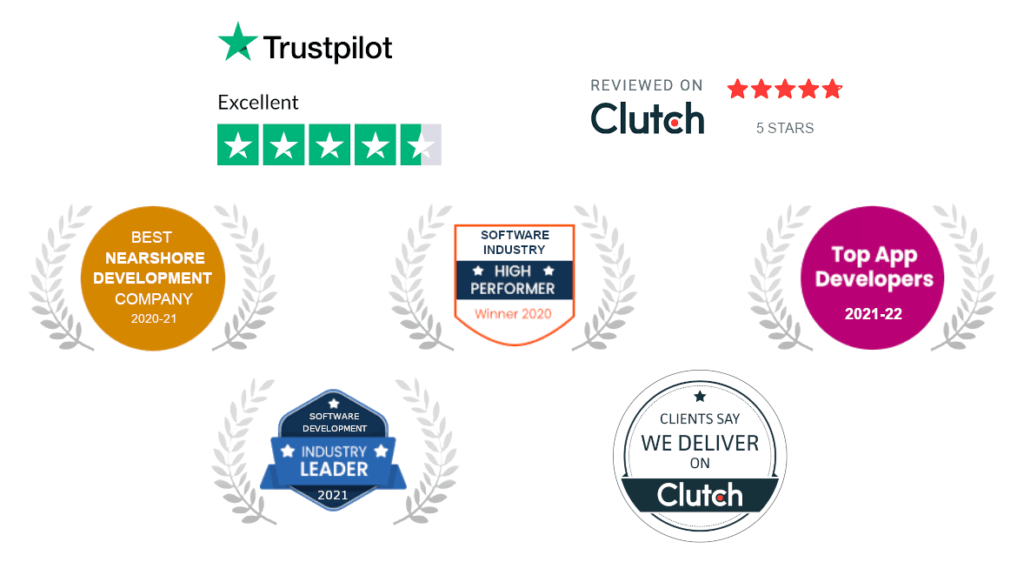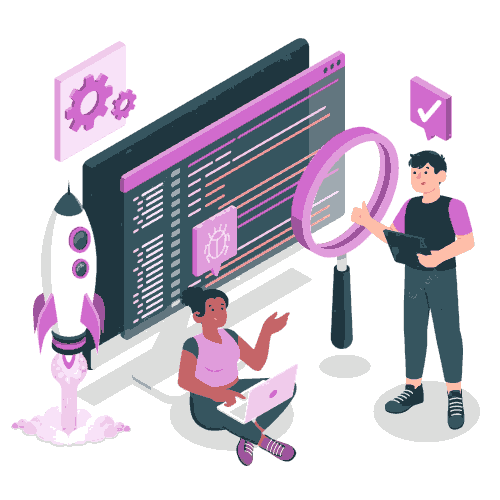We Help You Hire a Build Engineer From South America
Your next project can often be stressful and time-consuming if you cannot find the right nearshore company to hire with. Smart, responsible, hardworking, and experienced Build Engineers that are ideal candidates for your role.
Our AI matching algorithm helps your organization find the ideal development partner for your project. The method we use to match a Build Engineer your team is a combination of data and personal interviews.
We are dedicated to helping you hire Build Engineers who will contribute quality code right from the start. This is why we have refined our hiring processes over the past several years and have become a trusted partner for many startups that are growing rapidly. Add an expert to your team with OPSPROS and hire your future Build Engineer.
Work to US Time
Our Build Engineers work US hours and are happy to communicate with your existing team so they can gel with them.
Brazilian Rates
Our team is made up of talented and experienced Build Engineers from Brazil who are eager to work with US companies.
No Employment Tax
Benefits, local employment taxes, and other employment-related expenses are handled by our company.
Tested Build Engineers
It ensures your hiring a skilled professional who has passed our testing process when you hire a Build engineer from us.
Testimonials



Why Do You Need A Build Engineer?

In today’s rapidly evolving software development landscape, the need for efficient and seamless build processes cannot be overstated. A build engineer plays a vital role in ensuring the smooth functioning of the software development team by managing the build and deployment processes. Their expertise lies in automating and optimizing these processes, allowing developers to focus on coding and delivering high-quality software. Here’s why you need a build engineer for your software development team:
Streamlined Build Processes:
A build engineer establishes streamlined build processes, ensuring consistent and reliable software builds. They configure build tools, manage dependencies, and set up automated build scripts. This streamlines the process of compiling, testing, and packaging software, reducing manual effort and minimizing the risk of errors.
Continuous Integration and Deployment (CI/CD):
A build engineer is essential for implementing CI/CD pipelines. They integrate code changes regularly, enabling rapid feedback loops, early bug detection, and faster time-to-market. They automate deployment processes, ensuring smooth and efficient delivery of software updates, and enabling iterative development.
Quality Assurance:
Build engineers contribute to the quality assurance efforts of the development team. They define and enforce coding standards, conduct static code analysis, and perform build and deployment testing. This helps identify and rectify issues early in the development cycle, improving overall software quality.
Collaboration and Support:
Build engineers collaborate with developers, testers, and other team members to understand their requirements and provide technical support. They troubleshoot build failures, resolve dependencies, and assist in debugging and resolving integration issues. Their expertise and support enable smoother collaboration within the team.
Infrastructure Management:
A build engineer manages the infrastructure required for building and deploying software. They oversee the configuration and maintenance of build servers, version control systems, and artifact repositories. This ensures a reliable and scalable infrastructure, facilitating efficient development and deployment processes.
All in all
The role of a build engineer is crucial for optimizing software development processes. By streamlining builds, implementing CI/CD, ensuring quality assurance, providing collaboration and support, and managing infrastructure, they contribute significantly to the overall success of a software development team. Having a dedicated build engineer allows developers to focus on their core responsibilities, enhances productivity, and enables the delivery of high-quality software in a timely manner.
Difference between a Build Engineer and DevOps Engineer?

As many people get confused between a Build Engineer and a DevOps Engineer we thought we would clarify the differences below.
A build engineer and a DevOps engineer have distinct but interconnected roles in the software development process. A build engineer primarily focuses on streamlining and automating the build and deployment processes. They ensure the smooth functioning of software builds, manage dependencies, and optimize the compilation, testing, and packaging of software.
On the other hand, a DevOps engineer has a broader scope. They are responsible for the entire software development lifecycle, encompassing development, operations, and collaboration. DevOps engineers emphasize automating and integrating the development, testing, and deployment processes, in addition to managing infrastructure, monitoring, and ensuring continuous delivery.
While both roles involve automation and optimization, the DevOps engineer’s responsibilities extend beyond build management to encompass the entire software development and delivery pipeline.
- Faster Time-to-Market
- Improved Collaboration
- Enhanced Quality and Stability
- Increased Scalability
- Reduced Downtime
- Continuous Improvement
- Cost Efficiency
- Increased Customer Satisfaction

JOÃO SOUZA
Build Engineer
9+ Years of Build Engineering and 8+ Years of Linux Development. Has a wealth of web development expertise across many industries

RICARDO VIEIRA
Build Engineer
8+ Years of Build Engineering 8+ Security Has worked in companies with large number of visitors and dealt with scaling problems.

PEDRO BARBOSA
Sr Build Engineer
13+ Years of Build 10+ Infrastructure Engineer. Experienced senior Build Engineer who enjoys a challenge.
What does a Build Engineer do?
A build engineer is responsible for managing and optimizing the build and deployment processes within a software development team. Their role involves a range of activities aimed at streamlining and automating the software build pipeline.
Build Process Configuration: The build engineer configures and maintains the build tools, compilers, and build scripts necessary for compiling, testing, and packaging the software.
Dependency Management: They manage dependencies, both internal and external, ensuring that the required libraries, frameworks, and components are available for the build.
Automation and Continuous Integration: The build engineer automates the build process, enabling continuous integration.
Build Failure Troubleshooting: When build failures occur, the build engineer investigates and resolves the issues.
Build Performance Optimization: The build engineer continuously looks for ways to optimize the build process.
Build Documentation and Reporting: The build engineer maintains documentation related to the build process, including build configurations, dependencies, and deployment steps.


We Are A Solid Platform Development Partner
OpsPros understands the importance of working with a reliable partner. As a result, we provide a premium and professional service to all our clients. Get in touch with us now to start your Platform development team!
How do you Hire a Build Engineer?
Follow these three steps to hire a Build Engineer:
Please click on the button below and click send on the form once you’ve written a description of your project and needs.
Interview Build Engineers based on their resumes. Start shortlisting professionals you want to interview once proposals start coming in.
When you write your requirement description, you determine the scope of your work and the type of Build Engineer you need.
In order to receive a fast and detailed response, please include the following information:
Detailed deliverables: From websites to APIs and big data analytics, list them all.
Identify whether the project is small or large in your job posting.
Let us know if you prefer experience with certain industries, software.
Billing: Please indicate your preference for hourly rates versus priced monthly contracts.
How much does it cost to Hire a Build Engineer?
Several factors affect the cost, including expertise, experience, market conditions, and location.
Additionally, an experienced Build Engineer will provide higher-quality results, work faster, and have more specialized knowledge.
Once they gain experience, beginners might be able to price their services higher.
Below are the rates for hiring our South American Build Engineers
Junior
Prices From- Works to U.S time zones
- No Recruitment Fees
- Vetted Skills & Experience
- Fulltime Working for you
- No Unreliable Freelancers
Intermediate
Prices From- Works to U.S time zones
- No Recruitment Fees
- Vetted Skills & Experience
- Fulltime Working for you
- No Unreliable Freelancers
Senior
Prices From- Works to U.S time zones
- No Recruitment Fees
- Vetted Skills & Experience
- Fulltime Working for you
- No Unreliable Freelancers
We have Build Engineers in South America available for hire!
Depending on the exact skill requirements and experience requirements, the price of Engineers may vary slightly.
Depending on your project, you’ll need to determine which is right for you.
Do Build Engineers write code?
Build engineers often write code or scripts to automate and optimize the build and deployment processes. Here are two examples of how build engineers can use Python for these tasks:
Build Script Automation: Build engineers can write Python scripts to automate the execution of build tasks. For example, they can create a script that fetches the latest source code from a version control system, compiles the code, runs unit tests, and packages the software into a deployable artifact. This script can be scheduled to run automatically or triggered by specific events, such as code commits.
:
import subprocess
def build():
# Fetch latest source code
subprocess.run(['git', 'pull'])
# Compile code
subprocess.run(['make'])
# Run unit tests
subprocess.run(['pytest'])
# Package software
subprocess.run(['tar', '-czf', 'app.tar.gz', 'app'])
if __name__ == '__main__':
build()Dependency Management: Build engineers can also write Python scripts to manage dependencies required for the build process. For instance, they can create a script that retrieves and installs the necessary libraries or packages. This ensures that the build environment has the correct dependencies and versions.
import subprocess
def install_dependencies():
# Install required packages
subprocess.run(['pip', 'install', 'numpy'])
subprocess.run(['pip', 'install', 'requests'])
subprocess.run(['pip', 'install', 'pytest'])
if __name__ == '__main__':
install_dependencies()Interview Questions to ask a Build Engineer
Can you describe your experience with build automation and continuous integration tools?
This question helps gauge the candidate’s familiarity with popular build automation and continuous integration tools such as Jenkins, Travis CI, or GitLab CI/CD. Look for candidates who can articulate their experience in setting up and configuring build pipelines, integrating code changes, and facilitating automated testing and deployment processes.
How do you ensure the stability and reliability of build processes in a complex software development environment?
This question assesses the candidate’s ability to handle challenges in a complex development environment. Look for answers that highlight their strategies for managing dependencies, handling version conflicts, troubleshooting build failures, and ensuring consistent and reliable builds across different projects or modules.

Can you describe a situation where you optimized the build process to improve efficiency or reduce build times?
This question evaluates the candidate’s problem-solving and optimization skills. Look for examples where they identified bottlenecks in the build process, introduced optimizations such as parallelization or caching mechanisms, and achieved significant improvements in build performance or efficiency.

Do you enjoy Working Alone or within a Team?
There is no right or wrong answer to this question since Build engineers can have any combination of skills. Having an engineer who is hardworking and independent may be important to you. You might prefer someone who works well with others and isn’t stubborn.
Describe a situation where you had to collaborate with cross-functional teams, such as development or operations. How did you ensure effective communication and successful outcomes?
This question evaluates the candidate’s ability to collaborate and communicate with different teams. They should provide an example where they worked with teams outside of their own, discussing the challenges they faced and how they facilitated effective communication and collaboration. The ideal response would showcase their teamwork, adaptability, and their role in achieving successful outcomes through effective cross-functional collaboration.
A Brief History of Build Engineering
Early Software Development Practices:
In the early days of software development, building and deploying software was often a manual and error-prone process. Developers would compile and package their code manually, leading to inconsistencies and delays in the development lifecycle.
Emergence of Build Engineering:
As software development practices evolved, the need for efficient and automated build processes became evident. Build engineering emerged as a dedicated discipline to streamline the build and deployment processes, ensuring consistency and reliability across projects.
Build Tools and Automation:
With the rise of build engineering, specialized tools and technologies were developed to automate the build process. Build tools like Make, Ant, and Maven became popular, enabling developers to define build configurations and automate tasks such as compilation, testing, and packaging.
Continuous Integration and DevOps:
The adoption of continuous integration (CI) practices further transformed the field of build engineering. CI emphasized integrating code changes frequently and automating build and testing processes. This led to the emergence of DevOps, where build engineers played a key role in orchestrating the entire software development and delivery pipeline.
Advancements in Build Infrastructure:
Advancements in cloud computing and virtualization technologies significantly impacted build engineering. Build engineers leveraged cloud platforms, containerization, and infrastructure-as-code practices to optimize build environments, improve scalability, and enable efficient build and deployment processes.
Modern Build Engineering Practices:
Today, build engineering continues to evolve. Build engineers employ a wide range of tools, technologies, and methodologies to automate, optimize, and monitor the build process. Continuous integration and deployment (CI/CD) pipelines, containerization, and infrastructure automation have become integral parts of modern build engineering practices.
The history of build engineering demonstrates the shift from manual build processes to automated and optimized workflows. The discipline has evolved in response to the growing complexity of software development and the need for faster, reliable builds. Build engineers continue to play a crucial role in ensuring smooth, efficient, and scalable build and deployment processes, enabling development teams to deliver high-quality software more effectively.
Why you should choose us to hire a Build Engineer?
As a leading Nearshore Technology Solutions provider, we provide high-quality Build Engineers at reasonable prices. High-performance, scalable solutions are our goal for our clients. Throughout the project development phase and beyond, we strive to create long-term value.
Since 2014, we’ve matched skillful Build Engineers with great teams for over a hundred startups and tech companies worldwide.
You will find our Build Engineers to be devoted members of your team, fully integrating into your team’s operation.
Build Engineers that we hire undergo a thorough vetting process to ensure they have the necessary communication skills, remote work readiness, and technical skills (both for Build engineering, development, and cloud ).
Reduce Costs
In order to reduce costs, companies usually outsource. The cost of hiring software engineers outside the United States is lower. Additionally, you will be able to reduce overall employment costs significantly. There won’t be any US or European employment taxes, benefits, redundancy liabilities, or office space fees.
Ramp Up Faster
Taking advantage of growth and downsizing quickly can be a great competitive advantage for any industry. When you hire Brazilian Engineers through us, you will be able to scale up or down as needed, and do so relatively easily.
Trusted Partner
By outsourcing BuildEngineers, you’re entrusting your project to a company with extensive experience helping businesses succeed. Thus, you can rest assured that your application will be delivered on schedule and within budget.
Why hire a Build Engineer?
Why hire a Build engineer for your software project? There are several ways in which development projects benefit from having Build engineers. Here are a few examples of software and procedures that demonstrate these benefits:
Streamlined Build Processes
A build engineer establishes streamlined build processes, ensuring consistent and reliable software builds. They configure build tools, manage dependencies, and set up automated build scripts.
Efficient Continuous Integration and Deployment (CI/CD)
A build engineer is essential for implementing CI/CD pipelines. They integrate code changes regularly, enabling rapid feedback loops, early bug detection, and faster time-to-market. They automate deployment processes, ensuring smooth and efficient delivery of software updates.
Improved Software Quality
Build engineers contribute to the quality assurance efforts of the development team. They define and enforce coding standards, conduct static code analysis, and perform build and deployment testing. This helps identify and rectify issues early in the development cycle, improving overall software quality.
Enhanced Productivity
Having a dedicated build engineer allows developers to focus on their core responsibilities, enhancing productivity. The build engineer automates time-consuming build tasks, reducing manual effort and minimizing the risk of errors.

- Continuous Integration and Deployment (CI/CD)
- Improved Automation
- Infrastructure as Code (IaC)
- Monitoring and Alerting
- Better Collaboration and Communication
- Improved Security and Compliance
How do we test a Build Engineer to check his skills?

To test a Build engineer, we evaluate their proficiency in infrastructure and build management, architecture design, scalability, monitoring, security, and collaboration. Assess their ability to design and optimize architectures for high availability and performance, their experience with implementing monitoring and alerting systems, and their knowledge of security practices and compliance.
Practical exercises, scenario-based questions, and discussions about past projects can provide insights into their problem-solving skills, technical expertise, and ability to work effectively with cross-functional teams. Additionally, assessing their familiarity with relevant tools and technologies, their understanding of cloud platforms, and their commitment to continuous learning can help gauge their suitability as a platform engineer.
How do you Integrate Build Engineers into your existing development team?
Integrating Build Engineers into an existing development team requires careful planning and effective collaboration. Here’s how to approach the integration:
Assess Current Team Structure and Processes:
Evaluate the current development team structure, processes, and workflows. Identify areas where Build engineering practices can bring the most value and align with the team’s goals and project requirements.
Define Roles and Responsibilities:
Clearly define the roles and responsibilities of Build Engineers within the development team. Determine how they will collaborate with developers, testers, and other stakeholders. Ensure everyone understands their respective roles and the value each role brings to the team.

Promote Cross-Functional Collaboration:
Encourage cross-functional collaboration between Build Engineers and other team members. Facilitate regular meetings, stand-ups, and knowledge-sharing sessions. Foster an environment where team members can learn from each other, exchange ideas, and work together to solve challenges.
Establish Continuous Integration and Deployment (CI/CD) Pipelines:
Implement CI/CD pipelines and automation practices that seamlessly integrate with the existing development workflow. Collaborate with Platform Engineers to configure and optimize these pipelines, ensuring a smooth and efficient software delivery process.
Provide Training and Support:
Offer training and support to the development team to familiarize them with Build engineering concepts, tools, and practices. Conduct workshops, provide documentation, and encourage skill-sharing sessions. This ensures that everyone understands the importance of the Platform and can actively contribute to its implementation.
Encourage a Culture of Continuous Improvement:
Promote a culture of continuous improvement and learning within the team. Encourage team members, including Build Engineers, to experiment, innovate, and propose process optimizations. Embrace feedback loops, retrospective discussions, and data-driven decision-making to drive continuous improvement.
Ready for Sucess
By following these steps, integration of Build Engineers into an existing development team can be done effectively, ensuring collaboration, streamlined processes, and successful adoption of Build Engineering practices throughout the software development lifecycle.

How long on average does a Build Engineer stay at a company?
Build Engineers in the US tend to stay between 1.4 and 3.3 years in their jobs, with larger companies keeping workers longer. On average, Brazilians spend between 1.9 and 4.1 years in the job, with Sao Paulo residents spending the shortest amount of time there. Previously, people tended to spend their entire careers with the same company.
Build Engineers with experience may depart from one job to another for new opportunities and more money, as such longevity is no longer the norm. The most in-demand Platform pros can migrate between jobs (or even freelance) fairly easily in this market due to a low unemployment rate and a great need for professionals with deployment, cloud, and other important skills. We offer perks to attract and retain top talent, and we value communication with employees.

Frequently Asked Questions (FAQs)
Our services are trusted by hundreds of startups and tech companies worldwide, and we have matched hundreds of skilled Engineers to great development teams in the US, UK and Canada. Every Build Engineer in our network goes through a vetting process to verify their communication abilities, remote work readiness, and technical skills, both for depth in DevOps and breadth across the greater development and deployment domain.
The job description of a Platform Engineer should include the following:
Deployment, implementing, and managing software
New program testing and evaluation
Enhancing existing programs by identifying areas for improvement
Scripting and Automation
Analyzing operational feasibility
Establishing procedures for quality assurance
Implementing software tools, processes, and metrics
Upgrades and maintenance of existing systems
Assisting other developers, UX designers, and business analysts with their tasks
It’s not enough to just ship features; your software needs to help your business succeed. In order to better understand what you’re building, for whom, and why, we’ll begin our collaboration with a discovery process.
Our headquarters are in Sao Paulo, Brazil. We have clients from all over the world. We have successfully collaborated with companies in North America, Asia, the Middle East, and Europe. A good understanding of each client and excellent English communication skills help the process run smoothly.
We can work with you to scale the team down as needed and make sure you have the correct skills required for each project phase.
All Types! You can hire a Build Engineer on a full-time, part-time, or contract-to-hire basis at OPSPROS. You can find a Build Engineer in a time zone that suits your needs thanks to our global network of skilled Build engineers. Engineers who work remotely for us are all mid- and senior-level professionals, ready to work right away.

